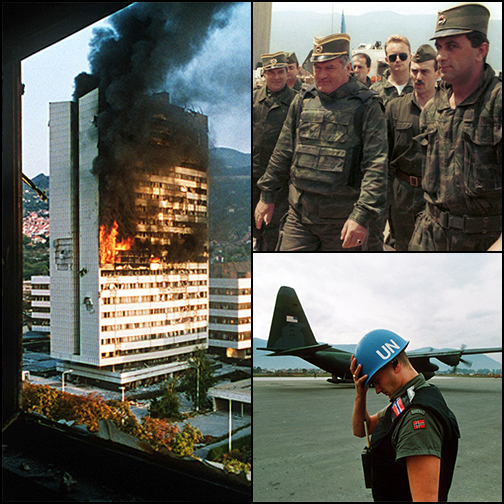War in Bosnia and Herzegovina
| Bosnian War | ||||||||
|---|---|---|---|---|---|---|---|---|
| Part of the Yugoslav Wars | ||||||||
 The executive council building burns after being hit by artillery fire in Sarajevo May 1992; Ratko Mladić with Army of Republika Srpska officers; a Norwegian UN soldier in Sarajevo. |
||||||||
|
||||||||
| Belligerents | ||||||||
|
1992: |
1992: |
|||||||
|
1992–94: |
1992–94: |
1992–1994: Supported by: |
||||||
|
1994–95: (bombing operations, 1995) |
1994–1995: Supported by: |
|||||||
| Commanders and leaders | ||||||||
|
|
(Vice president of CR Herzeg-Bosnia) …and others |
|
||||||
| Strength | ||||||||
|
ARBiH: 110,000 troops 100,000 reserves 40 tanks 30 APCs |
HVO: 45,000–50,000 troops 75 tanks 50 APCs 200 artillery pieces HV: 15,000 troops |
VRS: 80,000 troops 300 tanks 700 APCs 800 artillery pieces AP Western Bosnia: 4,000–5,000 troops |
||||||
| Casualties and losses | ||||||||
| 30,521 soldiers killed 31,583 civilians killed |
6,000 soldiers killed 2,484 civilians killed |
21,173 soldiers killed 4,179 civilians killed |
||||||
| additional 5,100 killed whose ethnicity and status are unstated | ||||||||
|
a From 1992 to 1994, the Republic of Bosnia and Herzegovina was not supported by the majority of Bosnian Croats and Serbs (who each had their own hostile entities). Consequently, it represented mainly the Bosniak ethnic group in Bosnia and Herzegovina itself. The post-war Bosnia and Herzegovina encompasses all three Bosnian ethnic groups. b Between 1994 and 1995, the Republic of Bosnia and Herzegovina was supported by, and represented, both ethnic Bosniaks and Bosnian Croats. This was primarily because of the Washington Agreement. |
||||||||
|
Total dead or disappeared 101,040 (total includes unknown status below, percentages ignore 'unknowns') |
Bosniaks | 62,013 | 61.4% |
| Serbs | 24,953 | 24.7% | |
| Croats | 8,403 | 8.3% | |
| Other ethnicities | 571 | 0.6% | |
|
Civilians 38,239 (percentages are of civilian dead) |
Bosniaks | 31,107 | 81.3% |
| Serbs | 4,178 | 10.9% | |
| Croats | 2,484 | 6.5% | |
| Other ethnicities | 470 | 1.2% | |
|
Soldiers 57,701 (percentages are of military dead) |
Bosniaks | 30,906 | 53.6% |
| Serbs | 20,775 | 36% | |
| Croats | 5,919 | 10.3% | |
| Other ethnicities | 101 | 0.2% | |
|
Unknown status (percentage is of all dead or disappeared) |
Ethnicity unstated | 5,100 | 5% |
|
Total killed 104,732 |
Bosniaks | c. 68,101 |
| Serbs | c. 22,779 | |
| Croats | c. 8,858 | |
| Others | c. 4,995 | |
|
Civilians killed 36,700 |
Bosniaks | 25,609 |
| Serbs | 7,480 | |
| Croats | 1,675 | |
| Others | 1,935 | |
|
Soldiers killed 68,031 (includes Police) |
Bosniaks | 42,492 |
| Serbs | 15,298 | |
| Croats | 7,182 | |
| Others | 3,058 |
Military stalemate
1992:
1992:
1992–94:
1992–94:
1992–1994:
1994–95:
1994–1995:
![]() Alija Izetbegović
Alija Izetbegović
(President of Bosnia and Herzegovina) ![]() Haris Silajdžić
Haris Silajdžić
(Prime Minister of Bosnia and Herzegovina) ![]() Sefer Halilović
Sefer Halilović
(ARBiH Chief of Staff 1992–1993) ![]() Rasim Delić
Rasim Delić
(ARBiH Commander of the General Staff 1993–1995) ![]() Enver Hadžihasanović
Enver Hadžihasanović
(ARBiH Chief of Staff 1992–1993)
...
Wikipedia
